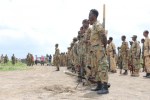On 15 August, the Interim Jubba Administration’s (IJA) parliament — which federal MPs attempted to dissolve in June due to a contested selection process — elected Ahmed Madobe as regional president in a landslide victory garnering 68 of 74 votes.
Madobe’s supporters, who celebrated in Kismayo, believe his victory over three other minor candidates will give the IJA the continuity it needs to continue building regional institutions while critics claim the win reflects how the leader still has a monopoly on the recognized political space in the region.
Under the Addis Ababa agreement that created the IJA, the term of the administration was set from August 2013-2015, during which time it was expected that the constitutional process would approve it as a Federal Member State (FMS).
But due to disagreements regarding the establishment of the Boundaries and Federation Commission (BFC), which is to make recommendations to the parliament on what the FMS should look like, the process to approve the current interim regional administrations as FMS has been delayed. In fact, the BFC has been essentially absent during the entire state formation process, making it politically irrelevant even as it is tasked with carrying out research to recommend what the boundaries of federal states should be.
It is possible that the IJA election is meant to “top up” the administration’s mandate by the length of Madobe’s new four-year term.
The Addis agreement also stipulated that Madobe could not replace the governor of Gedo region — Mohamed Abdi Khalil — but Madobe did just that after the IJA and its rivals in Gedo signed a political ceasefire.
In response to his sacking, Khalil told the media that the Ethiopian military was behind his firing and the arrest of him and others who opposed the move. More broadly, opposition to the IJA believe that Ethiopia’s role in the Jubba region goes beyond its AMISOM mandate in countering al-Shabaab and into manipulating the political environment.
The messy implementation of the Addis Ababa agreement and the controversial role of Ethiopia is part of a pattern in which the fundamentals of federalism in Somalia are consistently contested and its modalities are blurred:
- Despite the IJA suspending relations with the Somali government in June, there are over 1,300 IJA troops still set to be integrated into the Somalia National Army (SNA) — at least on paper;
- The IJA claimed to set up a “federal” immigration post on the Somalia-Ethiopia border in Dolow (Gedo region);
- Last week, Madobe appointed federal army colonel Abbas Ibrahim Gurey as “Gedo region’s military commander”– further blurring the line between federal and regional roles in command and control of security forces.
Just this week, an AMISOM commander from Djibouti claimed Ethiopia was not in Somalia to establish peace and security (implying there were ulterior motives) and complained that Ethiopian troops did not take orders from AMISOM headquarters.
For Madobe, each newly captured town or political crisis is an opportunity to show if he can expand his legitimacy and influence outside Kismayo in a way that encompasses the aspirations of the Jubba region’s constituents versus the interests of Ethiopia or others.
More pictures appeared this week of IJA forces on the frontlines north of Kismayo in Buulo Gaduud, where troops are preparing with Kenyan forces for an offensive in Middle Jubba, which is controlled entirely by al-Shabaab.
Conducting military operations — with foreign troops that prioritize their own interests — will continue to complicate efforts to set up locally credible administrations in towns captured from al-Shabaab, especially when the basic aspects of state formation and federalism remain contested or undefined:
- Immediately after al-Shabaab was ousted from Baardheere in late July, Somali forces argued over which factions would control the town, and it is still not clear if a consensus has emerged.
- Last week, Ethiopia-backed ASWJ troops in central Somalia said it rejected upcoming efforts to form a new administration with Hiiraan and Middle Shabelle regions. ASWJ intended to launch military operations to secure further territory in central Somalia, ostensibly to reduce the amount of territory the new administration could claim it had under its control.
Smoothing out Somalia’s state formation process probably can be improved if captured territory becomes a venue for negotiation and reconciliation rather than power projection.
But, as the Djibouti commander in AMISOM pointed out above, reconciliation is not always what the powers-that-be desire.
Discover more from
Subscribe to get the latest posts sent to your email.
Categories: Jubaland





 Key Takeaways from the Clashes in Jubaland and the Ankara Declaration
Key Takeaways from the Clashes in Jubaland and the Ankara Declaration  Analysis: Somali Government Executes Pressure Campaign against Jubaland
Analysis: Somali Government Executes Pressure Campaign against Jubaland  Somali Government Continues Onslaught Against Domestic Rivals With Impunity
Somali Government Continues Onslaught Against Domestic Rivals With Impunity  Analysis: Does Somalia’s Jubaland Leader Deserve Another Term?
Analysis: Does Somalia’s Jubaland Leader Deserve Another Term?
Leave a comment